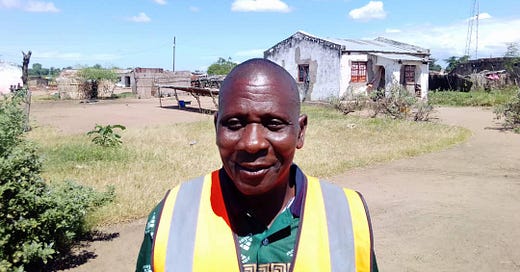WORLD TOILET DAY - 3,000 fishermen on Mbenje Island face sanitation crisis
As Malawi joins the world in commemorating World Toilet Day, local officials emphasize the urgent need for sanitation improvements at Mbenje island to safeguard public health and the environment.
SALIMA, Malawi (Planet Defence) - While fish catches on many shores of Lake Malawi have dwindled due to the climate crisis and overfishing, Mbenje Island in Salima District has managed to maintain a steady supply of fish. This success is largely due to the islanders' traditional stewardship practices, which emphasize sustainable fishing, including the recommended minimum fish size of 250 grams for consumption writes Owen Nyaka.
Located in the middle of Lake Malawi, Mbenje Island attracts fishermen from across the country, particularly from Lakeshore districts such as Mangochi, Nkhotakota, Rumphi, Nkhatabay, Karonga, Likoma, and Chizumulu islands.
However, despite its role as a fishing hub, Mbenje Island—under the jurisdiction of Traditional Authority Makanjira—lacks basic sanitation facilities, including toilets, which has become a growing concern for the community.
Rabisoni Chipangula, Secretary of the Mbenje Island Committee and Chairperson of Chikombe Beach Village Committee (BVC), expressed his frustration about the absence of toilet facilities on the island. He pointed out that while Malawi joins the world in commemorating World Toilet Day, a UN initiative to raise awareness about the global sanitation crisis, Mbenje Island’s needs have gone unmet for nearly two decades.
“For almost 24 years, we’ve been appealing for help in building modern toilets, but the situation remains unchanged,” Chipangula said. “The island is rocky, making it impossible to dig latrines. We have approached partners like RIPPLE Africa, USAID through the REFRESH program, and the Salima District Council for assistance, but there has been no response. Just yesterday, health workers from Salima District Hospital visited to distribute mosquito nets, and they themselves witnessed the dire state of sanitation on the island.”
Currently, fishermen on Mbenje Island have resorted to using a designated area as a makeshift toilet. Chipangula emphasized that sanitation facilities are a critical part of public health and well-being, yet millions of people around the world—including the communities on Mbenje Island—continue to face poor sanitation conditions. According to the WHO/UNICEF Joint Monitoring Program, over 50 million people in the SADC region still practice open defecation.
Poor sanitation and hygiene in Malawi cost the country an estimated $57 million annually, or 1.1% of its GDP, according to UNICEF's 2020 report. These conditions contribute to the deaths of approximately 842,000 people due to inadequate Water, Sanitation, and Hygiene (WASH) services.
Chipangula also noted that Mbenje Island’s fishing bylaws are designed to allow both fish production and agriculture to thrive. Fishermen on the island typically stay from April to November, when fishing season opens. During the offseason, they engage in agricultural production, which helps to sustain the community. This year, approximately 3,000 fishermen were on the island at the start of the season, with numbers growing during peak fishing months.
Amakhosi Jere, Deputy Country Director for the Restoring Fisheries for Sustainable Livelihoods in Lake Malawi (REFRESH) project—funded by USAID—explained that Salima District Council is the primary authority for addressing service delivery issues, including sanitation. He noted that the REFRESH project provided support in terms of training and capacity building, but the responsibility for building sanitation infrastructure lies with local authorities.
“Salima District Council is best placed to comment on issues of service delivery,” Jere said. “We have helped to highlight the gaps, but the responsibility for addressing these issues falls to the local government.”
Both RIPPLE Africa and Salima District Fisheries have confirmed that Mbenje Island lacks proper toilet facilities, and they acknowledge that the community’s requests for help have been long overdue. Patrick Zakeyo, the District Fisheries Officer, shared that while his office has raised concerns with the relevant authorities, they do not have the resources to construct toilets on the island. He suggested that a self-financing model—where local authorities collect fees from fishermen to fund the construction of toilets—could be a possible solution.
In nearby Nkhotakota District, BVCs have successfully generated revenue from toilet facilities, which has been used to improve sanitation infrastructure. Last year, Mbenje Island authorities visited these areas to learn from their experience.
A visit to Mbenje Island reveals the challenges faced by the community. While the island itself lacks toilet facilities, Chikombe Beach, which serves as a transit point to Mbenje, has seen the construction of several toilets through the Sustainable Fisheries and Aquaculture Development Project, an African Development Bank-funded initiative supporting infrastructure development along the lakeshore.
Historically, Mbenje Island was home to a permanent population who lived in grass-thatched houses made from sticks and mud. The island was considered sacred by its inhabitants, and people believed that killing a snake—an endemic species on the island—would bring storms as punishment. To appease the spirits, the island’s chief, Makanjira, initiated sacrifices and regulations.
Though much has changed over the centuries, including the migration of many former island residents to Chikombe Beach, traditional practices remain strong. For example, the closed fishing season is still strictly enforced, and the island’s bylaws prohibit women from visiting the island to avoid angering the spirits that are believed to reside there.



